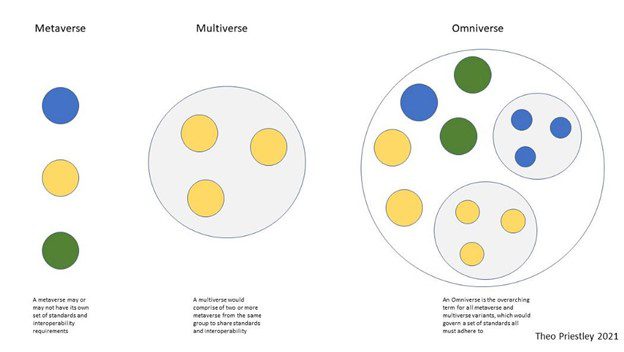As one searches the online space, the term “metaverse” is becoming increasingly common and one has certainly seen a spotlight on this ecosystem. Many people are having difficulties trying to understand this new paradigm, however, this has not stopped many early adopters from engaging with these projects, and seeing various metaverse projects take off and catch investor attention.
Whilst the technology for creating a metaverse is new, the concept was first described by Neal Stephenson in his science fiction novel ‘Snow Crash’ published in 1992. Although derived from cosmological concepts, the evolution of what Metaverse means is becoming synonymous with the virtual world. It is a system of numerous, interconnected virtual and usually user-generated worlds which are accessible through a single user interface.
However, the advent of metaverse might just be the beginning. The virtual space is going to evolve from Metaverse to Multiverse and eventually Omniverse.
Drawing inspiration from Cosmology
The concepts of Metaverse, Multiverse, and Omniverse will be familiar and easier to grasp to those interested in Cosmology. After all, these terms are inspired by Cosmology.
Metaverse is analogous to our universe but in a digital space. However, this digital space will be more immersive than the digital experiences we are used to now. As the universe is the sum of all existence; space-time and all its contents, Metaverse will be the sum of all of an individual’s and a community’s digital existence.
A Multiverse is a collection of multiple observable universes. Each universe in a multiverse shares common laws of physics, elementary particles, and everything in between with the parent universe. The universes within the multiverse can be called “alternate universes,” “parallel universes,” or “many worlds.” Expanding this hypothesis to the digital sphere, a multiverse will be a collection of numerous metaverses. They can share similar programming languages, be interoperable, and have some assets and avatars between different metaverses.
An Omniverse is a superset of every single universe and multiverse that has existed. Omni in Latin means of all things. In essence, Omniverse is the final existence. Although digitally we are from creating this space, we can be sure that every attempt at interoperability is an attempt towards reaching Omniverse.
In digital cosmology, Metaverse is at the lowest level. There can be a Facebook Metaverse, a Google metaverse, and so on. Groups of these metaverses through partnerships and user demand can evolve into a Multiverse. Doing so will require a common set of standards, frameworks, and interoperability requirements making sharing of content, data secure and fast.
At the highest level, there is Omniverse which essentially becomes an overarching term that covers all the Metaverses and Multiverses that not only exist but will exist in the future also.
Powering the creator economy of an Omniverse
If the developers move towards the Omniverse in the virtual space, there will be a need for a set of overarching standards that will govern the sharing of content and data between multiverse. One of the needs for standardization will be to have a creator economy accessible and ubiquitous to all. Even though the creator and influencer economy has blossomed over the past decade, there is no robust platform for them to consolidate and monetize their fanbase.
While leveraging these above concepts, the team from Dual Cityzen, created a Metaverse that aims to take influencers to the next level. By providing the infrastructure influencers need to build thriving Metaverse communities, large-scale adoption will become a reality. Equipped with Web 3.0 governance, access tokens & powered by innovative NFT solutions, Dual Cityzen empowers you to build and take control of your own Metaverse Communities.
Influencers, (the key drivers of online engagement and adoption today), now account for more than 50 million users globally, Influencer entities include professional & collegiate sports clubs, legacy media properties and verified groups such as athletes, content streamers & celebrities. Influencers are some of the most trusted entities on Earth and have grown exponentially in their importance to global consumption.
The Dual Cityzen metaverse will be a blockchain-based, decentralized community framework that empowers Influencers, and will make the Metaverse a much more equitable space than the centralized platforms of social media. Powered by the immersive technology tools of extended reality (XR), dual cityzen creates personalized metaverse communities for Influencers that provide the resources to build, grow, and monetize their assets and fanbase
Dual Cityzen is in the prime position to take the influencer economy to the next level, through utilizing the best that the ownership economy has to offer, and leverage the Web 3.0 tools available to deliver true value that influencers can pass on to fans as well as brands. With Metaverse and Multiverse at the heart of the project, the platform will become a fully immersive experience, while giving its users all monetization tools required to move forward and into this new and unexplored space.
Again, the question influencers are asking, is “When will I get my Dual Cityzenship?”


